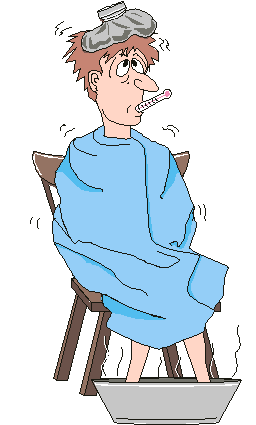Symptomatic benefits of hot drinks for cold and flu
 Researchers from Cardiff University, in the UK studied the effects of fruit drinks on nasal airflow and cold and flu symptoms.
Researchers from Cardiff University, in the UK studied the effects of fruit drinks on nasal airflow and cold and flu symptoms.
First, the details.
- 30 adults suffering from common cold/flu participated.
- Each person had at least 3 common cold symptoms (runny nose, sneezing, blocked nose, sore throat, cough), with at least 2 symptoms judged as moderate on 4-point scale of (0=not present to 3=severe).
- Subjective symptoms and nasal resistance tests were repeated immediately, then again 15 and 30 minutes later.
- The volunteers were randomly assigned to drink an apple and blackcurrant cordial within 10 minutes of their test of nasal airflow resistance.
- A cordial is a very sweet, fruit-flavored drink.
- Subjective and objective common cold/flu symptoms were measured.
And, the results.
Response to the hot drink
- Nasal airflow was not affected at any time.
- Subjectively, there was immediate significant improvement in the sensation of airflow (ie, the nose felt clearer) at 15 and 30 minutes.
- There was an immediate improvement in cough sensation, sore throat, and chills.
- These symptoms remained significantly reduced at 15 and 30 minutes.
- Tiredness significantly improved immediately, but was not significant 30 minutes later.
- There was no immediate effect on runny nose and sneezing, but these became significantly reduced 15 and 30 minutes later.
Response to the room-temperature drink
- Significantly reduced airflow at 15 and 30 minutes.
- An immediate and sustained reduction in sneezing.
- Significantly reducing cough and runny nose symptoms at 15 and 30 minutes.
- No effect on sore throat, chills, or tiredness.
The bottom line?
The small number or participants makes it difficult to come to concrete conclusions.
Objectively, neither drink had a significant effect.
Subjectively, the volunteers reported a range of benefits.
Placebo effect?
Maybe. But so what?
The main reason to drink fluids is to prevent dehydration. Therefore, the benefits reported here are secondary. And if subjective improvement encourages patients to increase their fluid intake, so much the better.
Medscape has recommendations to prevent dehydration during influenza.
4/26/09 17:18 JR